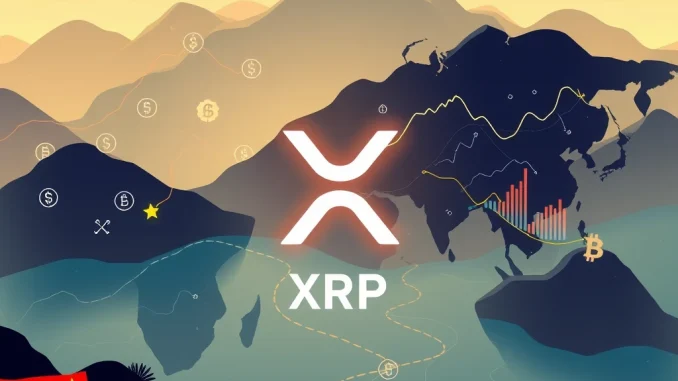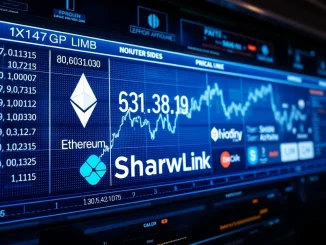
Get ready for some significant news from the intersection of traditional business and cryptocurrency! Webus International Limited, a company known for its AI-powered mobility solutions in China, has just announced a strategic financial initiative that has the crypto world buzzing. They plan to raise a substantial amount – up to $300 million – specifically to establish an **XRP** reserve. The goal? To support their ambitions in the realm of global payment solutions.
Webus’s Strategic Move: Building an XRP Reserve
Announced on May 29th via GlobeNewswire, Webus International’s plan signals a notable step for a China-based firm into the practical application of cryptocurrency for core business functions. This isn’t just speculative investment; it’s about leveraging a digital asset for operational efficiency, specifically in handling payments across borders.
Why build an **XRP** reserve? The underlying idea is likely to use XRP as a bridge currency or a readily available asset pool to facilitate faster, cheaper, and more efficient international transactions compared to traditional banking methods. This could be crucial for a company involved in global supply chains, international partnerships, or expanding its services worldwide.
Powering Global Payments with Crypto: Why XRP?
The choice of **XRP** for global payments isn’t random. The digital asset is designed specifically for speed and low cost in cross-border transactions, often associated with Ripple’s suite of payment products (though the announcement doesn’t explicitly mention using Ripple’s services, building an XRP reserve is a foundational step for such use cases). Key advantages often cited include:
- **Speed:** Transactions can settle in seconds, unlike traditional wire transfers that can take days.
- **Cost:** Fees are typically fractions of a cent per transaction.
- **Scalability:** The XRP Ledger is built to handle a high volume of transactions.
- **Liquidity:** XRP is traded on numerous exchanges globally, making it relatively easy to acquire and convert.
For a company like Webus dealing with international operations, optimizing the flow of funds is paramount. A dedicated **XRP** reserve could provide the necessary liquidity and infrastructure to streamline these processes, potentially reducing operational costs and improving cash flow efficiency.
How is Webus Funding This Massive Reserve?
Interestingly, Webus is opting for a non-equity financing approach to build this significant **XRP** reserve. This means they are not selling new shares of the company to raise the funds. Instead, their strategy involves a mix of traditional financial tools:
- **Available Cash Reserves:** Utilizing existing funds the company holds.
- **Bank Loans:** Securing debt financing from traditional banking institutions.
- **Shareholder Guarantees:** Shareholders providing assurances to lenders.
- **Institutional Credit Lines:** Establishing lines of credit with banks or financial institutions.
This blend highlights a growing trend where traditional finance mechanisms are being used to fund initiatives in the digital asset space. It shows confidence from both the company and potentially its financial partners in the strategic value of leveraging crypto for specific business use cases like **global payments**.
The Significance for China Crypto and Corporate Crypto Adoption
This move by Webus is particularly noteworthy given the regulatory landscape surrounding **China crypto**. While personal crypto trading has faced restrictions, the government has shown interest in blockchain technology and its applications, including central bank digital currencies (CBDCs) and potentially enterprise-level use cases. A company like Webus, operating within China, pursuing such a large-scale **corporate crypto adoption** initiative for international payments could signal evolving perspectives or specific allowances for business-focused applications of digital assets, especially those aimed at improving global trade efficiency.
This announcement adds another data point to the accelerating trend of **corporate crypto adoption**. More and more companies are exploring or actively implementing strategies that involve digital assets, whether for treasury management, supply chain finance, or, as in Webus’s case, enhancing **global payments**. It demonstrates a maturing view of cryptocurrencies not just as speculative assets, but as functional tools for modern business operations.
What Does This Mean for the Future?
Webus’s plan to raise $300 million for an **XRP** reserve is a bold statement. It underscores the potential that companies see in digital assets to solve real-world business problems, particularly in the complex area of international money movement. While the success of this initiative will depend on execution, regulatory factors, and market conditions, it’s a clear indicator that the lines between traditional corporate finance and the crypto world are continuing to blur.
Keep an eye on how Webus implements this strategy and the impact it has on their global operations. It could serve as a significant case study for other companies considering similar moves in leveraging digital assets for efficiency gains.
Summary
In a significant development, China’s Webus International Limited is embarking on a plan to raise up to $300 million through traditional financing methods to establish a dedicated **XRP** reserve. This reserve is intended to bolster the company’s capacity for handling **global payments** more efficiently. The move highlights growing **corporate crypto adoption**, even from firms operating within the **China crypto** ecosystem, and reinforces the view of **XRP** as a viable asset for facilitating cross-border transactions. This initiative by **Webus** represents a tangible example of how businesses are exploring digital assets to gain a competitive edge in the global marketplace.



